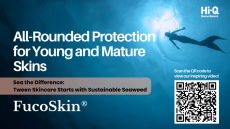The evolution of the halal trend part II: Indonesia leads innovation

There are a number of key players throughout APAC that are leading the halal trend with new concepts and creations that appeal to consumer demands, with Indonesia dominating the sector.
“In terms of product innovation, the current leading country is Indonesia and they will continue to lead the way as all products in Indonesia, including beauty products, will have to have a halal certification by 2019,” said Sharon Kwek, Senior Beauty and Personal Care Innovation and Insight Analyst at Mintel.
In his report, entitled ‘Growing population outpacing products presents opportunity for halal haircare’, Andrew McDougall, Global Analyst at Mintel, stated that almost “90% of the population in Indonesia is Muslim and thus interested in halal certified products”.
As such, “according to Mintel GNPD, Indonesia accounts for 42% of new halal beauty and personal care products launched over the last three years (2013-2015)”, Kwek went on to say.
Following in Indonesia’s footsteps, there are several other halal-focused nations looking to grab market share.
“India, Malaysia and Pakistan have great potential for the growth of halal beauty because of their large Muslim populations,” Kwek emphasised.
Mainstream sector
Halal beauty product ranges were previously part of a niche sector, however, the area has since gathered interest and is set to see new global supporters and adopters.
Notably, Paragon Technology and Innovation PT was one of APAC’s most recognisable halal beauty companies, with its luxury and natural Wardah brand proving popular and reaching a value share of 2% in 2015.
Several other global players have also entered the halal market as they strive towards gaining certification.
L’Oréal Indonesia PT recognised Indonesia’s prominence in the sector and built a manufacturing facility to produce its ingredients. Currently, the company has approximately 145 of its ingredients halal-certified.
Colgate-Palmolive has also released a halal toothpaste featuring miswak, while Unilever Indonesia got onboard in 2015 by launching hair care brand Sunsilk Clean & Fresh.
Impact of certification
To build trust with consumers in the growing and conscientious market, brands are now placing importance on gaining halal certification on their individual portfolio products.
“A global standardised certification will help put things in place and facilitate the process; more importantly, it provides clearer information and a broader view of what beauty comprises beyond the ingredients that are commonly discussed,” concluded Kwek.
Global market intelligence company, Euromonitor International, revealed in September 2016 that halal beauty products are growing rapidly in Indonesia are expected to gain further traction as the Halal Product Certification Bill comes into effect, stipulating that all products should be halal-certified by 2019.
Indonesia passed the Halal Product Certification Bill in September 2014. The requirement sets out rules relating to all product ingredients, production machinery and equipment, along with the entire value-chain process.
While, in general, companies must ensure compliance with the Bill by checking that existing ingredients and whole products agree with halal certification rules, brands should start to explore longer term opportunities for product innovation to position themselves as a retailer of choice amongst consumers.
International manufacturers and retailers are expected to dominate this popular sector. They aim to create strategic marketing campaigns and provide consumers with an all-round experience that includes sampling.
Euromonitor International reported that whilst global counterparts obtain certifications, local manufacturers including Paragon Technology and Innovation PT will look to gear their marketing efforts towards local consumers to generate brand awareness and loyalty.
The third instalment of this three-part article looking at the evolution of the halal trend will be published on 14th December.



















